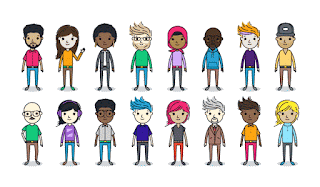Every semeser I try something new. Usually some things new. There are three new items that I plam on introducing this Fall.
One Day 1, I thought I would do something like this for an icebreaker:
1. Professor Jasmine Roberts-Crews TEDx Talk
"Are you tired of talking about race?" I will ask my students. In groups, I will request my students to write their own answers down. Then after a few minutes share their responses with the other group members. Each group will come to a group concensus as to the answer of that question. Then one member of the group will report the group's findings to the class. I will jot down on the board the students' answers and any major concerns, as well as those who answered "No" to the question. And, of course, "why."
Then we will watch Professor Jasmine Roberts-Crews' TEDx talk "I'm tired of talking about race," recorded at Ohio State University, April 5th, 2019.
Afterwards, we will revisit our discussion but thus time adding contemporary examples such as the January 6th Insurrection, police responses to BLM marches, legislative responses to Critical Race Theory (or what legislatures argue is CRT).
2. Ungrading
In a nutshell, ungrading is the nontraditional or alternative way of coming up with the end of course appraisal for each individual student. I used to do this. I try something new each semester. Sometimes it sticks for a while, but eventually, I make room to try new stuff. Some time ago I had students not only come up with their own grades but their own assignments as well.
I placed students in groups. In groups, students produced a group assignment but were assigned specific individual tasks within each group. Then, the group would assess their final product and individuals would assess their productivity. The average of those two became each students' course grade. I did reserve the right to alter grades if the evidence dictates.
Now ungrading is an actual thing. A national thing. Part of the pedagogy of teaching. A brand. So, before there was ungrading, I was ungrading. Now that there is ungrading, I am going to give it another go at it.
Jesse Stommel is at the epicenter of the ungrading movement.
3. Play
Play is not necessarily the opposite of work. The opposite of work is relaxation. Play, on the other hand, is action. Movement. Facilitates and promotes work. Play enhances work. Play is an important aspect of work.
We play when we are children. We make up games. We make up rules. We enforce those rules. Then when we get older we start playing games with established rules (like sports). And more of us fall to the wayside. Play is important because play taps into our imagination, creativity, improv, and innovation skills that translate well in group work.
One type of play that I plan on introducing to my classes is a role-playing game called Dungeons and Dragons. This game has players working both as individuals and as a group. There are all sorts of ways to break the ice, create group cohesion, and group identity. I think it is also important to push away from academics occasionally and play. Do something that is fun, but that also forwards the need for people to learn how to best work in groups while also maintaining their individual needs. There are rules to the game (gravity exists, some will be stronger or wiser or quicker than others) but most of the game is created in the players' heads and the outcomes are primarily based on what imaginative or innovative solutions the individuals or groups come up with.
So, these are the Big Three new items I will introduce to my classes this Fall. I will report back on the findings. Better yet, I will have students report back their findings/reflections.







